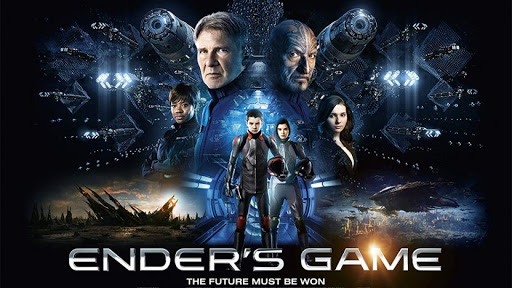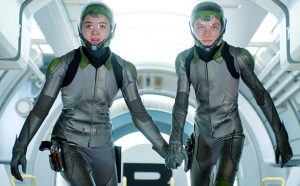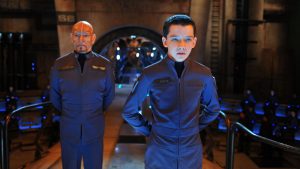“Ender’s Game (2013)”

“Ender’s Game” (2013) is a science fiction film directed by Gavin Hood, based on the popular 1985 novel of the same name by Orson Scott Card. Set in a future where Earth is preparing for an imminent alien invasion, the film follows a young boy, Ender Wiggin (played by Asa Butterfield), who is recruited into a military academy in space to train for the upcoming battle. The movie explores themes of leadership, morality, and the psychological toll of warfare, while delivering a visually stunning and emotionally complex narrative.
Plot Overview
The film takes place in a future where humanity has survived a devastating attack by an alien species known as the Formics, also called the “Buggers.” To prevent another invasion, the International Fleet recruits gifted children to be trained as military commanders. These children are rigorously trained through strategy games, simulations, and war exercises to prepare them for a potential future war.
Ender Wiggin is one such gifted child. He shows great promise in strategy and leadership but is also emotionally complex, struggling with the pressure placed on him. He is selected by Colonel Graff (Harrison Ford), the commander of the training program, to attend Battle School, where he undergoes intense training and simulation battles in zero gravity. Ender’s tactical brilliance and ability to think outside the box set him apart from the other recruits, but his isolation from his peers and the manipulative methods of his superiors begin to take an emotional toll on him.
As Ender progresses through the ranks, he is eventually promoted to Command School, where he faces his final test: a large-scale battle simulation in which he must lead a fleet against the Formics. However, the shocking revelation at the end of the movie forces Ender to confront the moral consequences of his actions, leaving a lasting impact on his character and the audience.
Key Characters
- Ender Wiggin (Asa Butterfield): The protagonist, Ender is a brilliant but sensitive boy who excels in strategy and tactics. Despite his youth, Ender is chosen to lead humanity’s fight against the Formics because of his unique combination of intelligence, empathy, and ruthlessness. His journey is one of self-discovery, as he grapples with the ethical dilemmas of warfare and leadership.
- Colonel Hyrum Graff (Harrison Ford): The head of Battle School, Colonel Graff sees Ender as humanity’s last hope and pushes him to his limits. Graff manipulates Ender throughout his training, isolating him from the other students and pushing him to achieve greatness, regardless of the psychological cost.
- Major Gwen Anderson (Viola Davis): A psychologist who monitors the emotional well-being of the students, Major Anderson is more empathetic than Graff and often questions the morality of the military’s methods. She expresses concern over the psychological pressure placed on Ender and other recruits.
- Petra Arkanian (Hailee Steinfeld): One of Ender’s fellow students and one of the few people he can trust, Petra becomes a close ally. She helps Ender during his training, especially in the zero-gravity combat scenarios, and supports him in his final mission.
- Mazer Rackham (Ben Kingsley): A legendary war hero who defeated the Formics in the previous invasion. Mazer becomes Ender’s mentor during the final stages of his training, helping him prepare for the ultimate battle.
- Valentine Wiggin (Abigail Breslin): Ender’s compassionate older sister, Valentine plays an important role in keeping Ender grounded and connected to his emotions. Their bond serves as one of the emotional cores of the film.
Themes
- Leadership and Isolation: One of the central themes of Ender’s Game is the burden of leadership. Ender is groomed to be a commander, but this comes at the cost of his relationships with others. Colonel Graff deliberately isolates Ender to sharpen his abilities, raising questions about the ethics of using children as tools of war.
- Morality in Warfare: The film delves into the morality of war, particularly the concept of preemptive strikes and the dehumanization of the enemy. Ender’s ability to think like his enemy makes him an excellent strategist, but it also leads him to question the morality of his actions, especially when the truth about the “simulations” is revealed.
- The Psychological Toll of War: The movie explores the emotional and psychological toll of training for and engaging in war, especially on young minds. Ender is pushed to the brink by the constant pressure to succeed, and the film emphasizes the mental strain that warfare places on those tasked with leading it.
- Empathy and Understanding: Despite being trained for violence, Ender’s greatest strength is his empathy. His ability to understand his enemies on a deep level is what ultimately makes him a successful commander, but it also forces him to confront the consequences of his actions, leading to a powerful emotional and moral reckoning.

Visual Style and Special Effects
One of the standout elements of Ender’s Game is its stunning visual effects, particularly in the scenes set in space and during the battle simulations. The zero-gravity training exercises are beautifully rendered, offering a fresh take on futuristic combat as the recruits use their environment to strategize and move. The space battles are grand in scale, with the climactic battle sequence offering impressive CGI work that immerses the audience in the tension and complexity of interstellar warfare.
The film’s design of the futuristic environments, from the Battle School to the final Command School, is sleek and immersive, contributing to the sense of being in a highly advanced, militarized society.
Performances
- Asa Butterfield delivers a compelling performance as Ender Wiggin, capturing both the character’s intelligence and emotional vulnerability. He portrays Ender as a complex individual who struggles with the weight of his responsibility and the brutal realities of his training.
- Harrison Ford brings gravitas to the role of Colonel Graff, portraying a man who is willing to manipulate and sacrifice for what he believes to be the greater good. His interactions with Ender are often tense, as Graff pushes Ender to his limits.
- Viola Davis and Ben Kingsley provide strong supporting performances, with Davis representing the voice of empathy and Kingsley bringing wisdom and a sense of urgency to his role as Mazer Rackham.

Reception
Ender’s Game received generally positive reviews for its visual effects, performances, and faithfulness to the source material, though some critics felt that the film lacked the emotional depth and complexity of the novel. Fans of the book appreciated the adaptation’s attention to key moments, but others felt that certain aspects of the story, such as the deeper philosophical themes, were underexplored in the film version.
The film grossed over $125 million worldwide but did not perform as well as expected at the box office, leaving plans for a potential sequel uncertain.
Conclusion
Ender’s Game (2013) is a visually striking and thought-provoking sci-fi film that explores deep themes of leadership, morality, and the human cost of warfare. With a strong performance from Asa Butterfield and a compelling story adapted from Orson Scott Card’s beloved novel, the film offers an exciting, action-packed narrative while raising important ethical questions about the nature of war and the responsibilities of those who lead. While not perfect, Ender’s Game remains a solid entry in the sci-fi genre, appealing to both fans of the original book and newcomers to the story.











